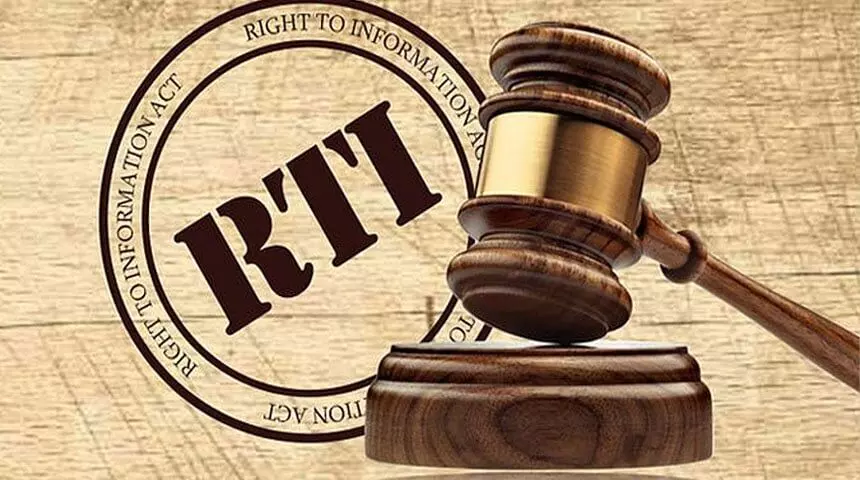RTI emerges as cornerstone in India's democratic framework
The RTI Act 2005 is often referred to as "sunshine legislation"
By B.V.Seshagiri Advocate
Representational Image.
Hyderabad: Right to Information Act, 2005 (RTI) has emerged as a cornerstone in India's democratic framework, embodying the principles of transparency and accountability vital for a thriving democracy. Enacted on 15th June 2005, the RTI Act empowers Indian citizens by granting them the legal right to access information from public authorities, thus enabling greater oversight and participation in governance.
Historical Context and Evolution: The foundation of the RTI Act lies in the constitutional right to freedom of speech and expression under Article 19(1)(a) of the Indian Constitution, which implicitly includes the right to know. This was unequivocally affirmed by the Hon'ble Supreme Court in the landmark 1976 case of State of Uttar Pradesh vs. Raj Narain, where the Court underscored that, in a democracy, citizens are the ultimate sovereigns and have an inherent right to know about their government's functioning.
The journey towards the RTI Act began with the Freedom of Information Act, 2002, which, despite being passed by Parliament, was never implemented. Recognizing the need for a more effective mechanism, the UPA government, guided by the National Advisory Council, introduced the Right to Information Bill. This culminated in the enactment of the RTI Act, 2005, which was passed by both Houses of Parliament in May 2005 and received Presidential assent in June 2005.
Objectives and Scope: The RTI Act was designed to create a framework that empowers citizens by providing access to information held by public authorities.
Its key objectives include:
1. Promoting Transparency and Accountability: By mandating the disclosure of information, the Act ensures that government operations are transparent and accountable.
2. Combating Corruption: The Act is a potent tool in exposing irregularities and malpractices within government institutions.
3. Empowering Citizens: By enabling citizens to question governmental decisions, the Act fosters an informed and vigilant public.
4. Constitution of Information Commissions: The Act establishes Central and State Information Commissions to oversee its implementation and address grievances.
Key Provisions:The RTI Act's broad scope covers all constitutional authorities, including bodies under both union and state governments, as well as organizations funded by public money. Some of the critical provisions include:
Section 2(h): Defines public authorities, encompassing all government bodies and institutions, including civil societies receiving public funds.
Section 4(1)(b): Requires public authorities to maintain and proactively disclose information to the public.
Section 6: Outlines a straightforward procedure for citizens to request information.
Section 7: Sets a time frame for Public Information Officers (PIOs) to respond to information requests.
Section 8: Lists specific exemptions from disclosure, such as those related to national security, foreign relations, and intellectual property rights.
Sections 19 & 20: Establish a two-tier appellate mechanism and impose penalties for non-compliance.
Impact and Significance: The RTI Act has significantly transformed Indian governance by empowering citizens to challenge governmental secrecy and abuses of power. It has played a pivotal role in promoting transparency, ensuring accountability, and fostering a culture of openness in government operations. The Act has exposed corruption, human rights violations, and administrative malpractices, reinforcing the democratic ideals of India.
Moreover, the Act has empowered ordinary citizens, activists, journalists, and civil society organizations, enabling them to access previously inaccessible information and engage in informed public discourse. The widespread use of the RTI Act, with approximately six million applications filed annually, underscores its relevance and importance.
Challenges and the Path Forward: Despite its successes, the RTI Act faces challenges, including the increasing backlog of appeals, delays in information dissemination, and the reluctance of some public authorities to provide information. Recent amendments affecting the tenure and salaries of Information Commissioners have raised concerns about the independence of these bodies, which must be safeguarded to maintain the Act's efficacy.
The Right to Information Act, 2005 (RTI), often referred to as "sunshine legislation," has been instrumental in enhancing transparency and accountability in Indian governance. By granting citizens the legal right to access information from public authorities, the RTI Act empowers them to scrutinize and hold the government accountable, thereby strengthening the fabric of democracy. It has played a crucial role in uncovering corruption and improving governance, transforming the relationship between the government and its citizens by making information more accessible and enabling informed participation.
To ensure the continued effectiveness of the RTI Act, it is essential to address ongoing challenges in its implementation and protect the autonomy of the institutions responsible for upholding this vital law. By doing so, the RTI Act can continue to illuminate the workings of the state, ensuring that democracy in India remains transparent, participatory, and accountable.